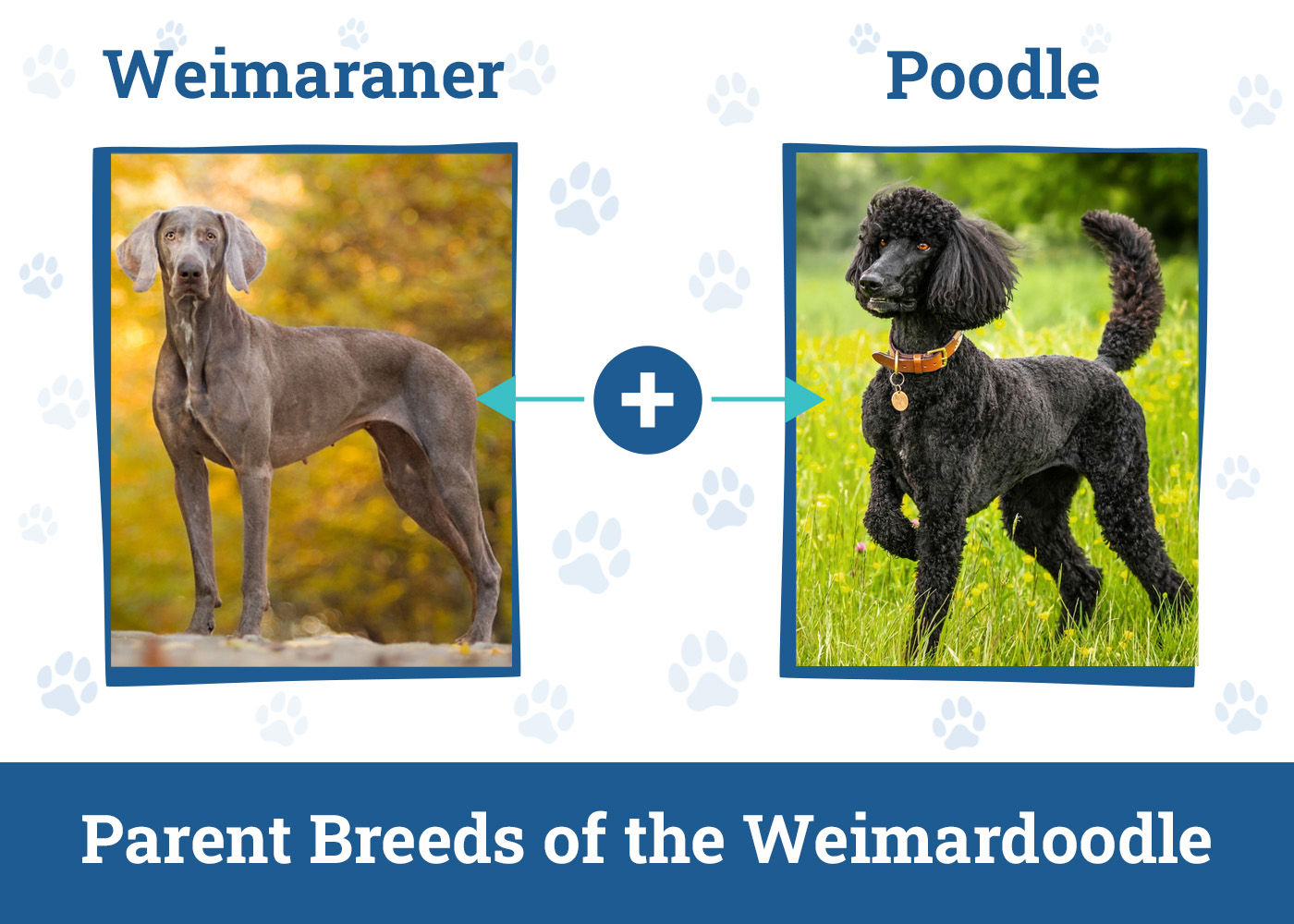In this article
View 8 More +The Weimardoodle is a hybrid breed resulting from the Weimaraner and the Poodle. Their playful and loving personality is sure to win the hearts of anyone who comes in contact with them.
Breed Overview
Height:
20–27 inches
Weight:
45–70 pounds
Lifespan:
10–13 years
Colors:
Dark brown, red brown, apricot, chocolate, white, black and white
Suitable for:
Active families, apartment dwellers
Temperament:
Active and affectionate
These pups are easy enough for novice owners to manage and make perfect companions for families of all ages. Their curly hair is low-shedding and hypoallergenic. As protective, loyal dogs, they form incredibly strong bonds with their family but get along well with children and other pets. The Weimaraner Poodle mix does have special health concerns that prospective owners should be aware of, as they may require extra veterinary attention.
Weimardoodle Characteristics

Weimardoodle Puppies
As with any breed, it’s important to buy Weimardoodle puppies from a reputable breeder. These dogs can be diagnosed with serious health conditions if careful attention isn’t paid to their breeding lines. This leads to health problems for the dogs and more vet bills for prospective owners. Make sure to ask for the parents’ health information to ensure that your Weimardoodle puppy won’t inherit any genetic conditions.
There aren’t any specific Weimardoodle rescue groups if you prefer adoption. They can sometimes be found through Weimaraner or Poodle rescue agencies, though.
As a crossbreed, the Weimardoodle can inherit a wide variety of traits from either one of their parents, so it’s important that you do your homework before bringing one home.


Temperament & Intelligence of the Weimardoodle
Weimardoodles are affectionate, happy, loyal, and active. They love to play with their family and are alert about things going on around them. This trait makes them excellent watchdogs, and they will be more than happy to alert you to anyone at your door. Since they thrive on attention, they don’t do well if they are left alone for extended periods. They will do best in a home where someone is home at varying intervals throughout the day.
Are These Dogs Good for Families? 🧑🧑🧒
The Weimaraner Poodle mix gets along well with children and are loving and playful toward them. Even so, interactions and playtime should always be supervised to ensure that the kids and the dog are safe.
Since Weimardoodles enjoy having constant companionship, they are great dogs to help teach children the responsibility of pet ownership.
Does This Breed Get Along With Other Pets? 🐶 😽
This dog breed gets along well with other house pets if they are raised with them from a young age. They are less prone to developing separation anxiety when home alone if they have another pet to interact with.
Weimardoodles are known to express feelings of jealousy if they feel that another pet in the household is getting more attention than they are and become overly attention-seeking.

Things to Know When Owning a Weimardoodle
Food & Diet Requirements 🦴
There are no special diet requirements for the Weimardoodle. They will do well on a high-quality kibble that is appropriate for their age. On average, they will need 2 to 3 cups of food daily. They can also benefit from supplementation with multivitamins, probiotics, and fish oil, though check with your vet first.
Exercise 🐕
As an energetic dog, Weimardoodles require at least 1 hour of exercise each day. They will enjoy having a portion of this as their daily walk, with another portion spent playing in the yard or a nearby dog park where they can run freely. Swimming, toys, fetch, and agility training are all great activities to do with your Weimardoodle.
As a rule, Weimardoodles will do better in cool climates, as they have dense fur and for the most part, can’t shed out their coat. They also do best with a nice-sized yard to play in; however, they can be fine in apartments with owners who are dedicated to giving them plenty of outdoor exercise.
Training 🎾
The Weimardoodle is eager to please its owner, which makes it easy to train. Strong leadership and positive reinforcement methods work well, and they respond to treats and vocal praise as motivation. This breed requires a gentle handler and doesn’t respond well to harsh or forceful training methods.
Depending on which traits your dog inherits from their parents, Weimardoodles can have strong hunting instincts and moments of stubbornness. Beginning obedience training early in life will help to tame these behaviors.
Grooming ✂️
Just how much grooming is required for a Weimardoodle depends on which parent they inherit their coat from. If your Weimardoodle inherits the curly coat of its Poodle parent, it will probably need brushing several times a week to avoid matting and tangles. This type of coat will also require trimming several times a year by a professional groomer. A good grooming schedule will provide your dog with a haircut about once every 3 months.
On the plus side, Weimardoodles are low-shedding dogs, so they are considered hypoallergenic and a good choice for owners with allergies to pet dander.
In addition to grooming their coat, you should clean this dog’s ears on a weekly basis with a cotton ball. Their teeth should also be brushed three to four times a week to eliminate bacteria and tartar buildup. Nails should be clipped once or twice a month when they get too long. If you’re not comfortable cutting your dog’s nails, this can be done by a professional groomer.
Health and Conditions 🏥
- Hypothyroidism
- Addison’s disease
- Legg-Calve-Perthes disease
- Cushing’s disease
- Skin problems
- Eye problems
- Patellar luxation
- Von Willebrand’s disease
- Progressive retinal atrophy
This breed has also been known to be diagnosed with epilepsy, distichiasis, or immune-mediated hemolytic anemia. These diseases can be life-threatening to your dog.
Male vs. Female
There aren’t any noticeable differences in personality between males and females of this breed, with the exception of unneutered males. They can have greater tendencies to guard than females or males that are neutered. They aren’t known for being aggressive, though, simply for being wary and standoffish to strangers.

3 Little-Known Facts About the Weimardoodle
1. Weimardoodles can run at speeds of up to 35 miles per hour (56.3 km per hour).
The parent breeds, Weimaraners and Poodles, are both fast dogs. Weimaraners were originally bred as hunting dogs and are capable of running at high speeds.
2. This breed is not currently recognized by any major kennel clubs.
A select few designer breed kennel clubs recognize the Weimardoodle as an official breed, including the Designer Dogs Kennel Club and the International Designer Canine Registry.
3. The Weimaraner dog was brought to the United States from Germany in 1929.
President Dwight D. Eisenhower brought a Weimaraner into the White House after World War II, making this parent of the Weimardoodle a popular breed.

Conclusion
Weimardoodles are great family dogs that love to interact and play with their owners. They get along well with children and other pets and are adaptable to most living situations. Before bringing one home, though, research your breeder and potential health conditions to ensure that your new pet is as healthy as possible. These dogs are also best kept in households where someone is home most of the time, but they can also seek companionship with other animals in your home.
Related Reads:
- Male vs Female Weimaraners: The Differences (With Info & Pictures)
- Cane Corso Weimaraner Mix: Info, Pictures, Care & More
Featured Image Credit: Blumqvist, Shutterstock


















